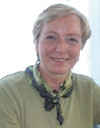
Reproductive health,Pillar for population policies [Archives:2003/668/Health]
September 15 2003
 |
 |
Moreover, working in the reproductive health field- whose status is deteriorating must be done in light of the cultural, social and religious particularities of the society and careful handling of related factors. For it is undoubtedly that working in such a sensitive issue would require great skills and high qualifications and knowledge. Many international organizations have taken the responsibility for participating in improvement of the reproductive health in Yemen, and now the GTZ’s office affiliated to the German-Yemeni cooperation’s Office is working hard on a family health and planning project in Sana’a.
Ms. Karen Nelson spoke to Hassan al-Zaidi of the Yemen Times about this project saying:
“The project is operating for the past two years in seven governorates; Marib, Sana’a, Amran, Hajja, Abyan, Ibb, and Mahwait. We have trained 2 men and two women in each governorate in administrative and technical aspects related to their work, and we trained them in modern as well as training methods. They have also been given special training on teenage and growing phases. These trained groups, whom we call as supporting groups, have received a number of courses sometimes reaching 9 courses all conducted by the family health and planning project.
In their turn the supporting groups carried on a number of courses and lectures for staff in the health sector in the district especially those working with reproductive health.
Generally speaking, the project is very assuring and we believe that those supporting groups have the ability to set up executive plans for their work every year and implement them. They also have the qualifications to work as teachers and trainers using all teaching methods visual and audio. The delighting fact is that those groups work together in team spirits both men and women in each governorate. Some of the supporting teams still require support from the project although many other groups have become completely independent and can work without the project’s aid. This is because all whom we have trained are in the first place employees with the health ministry’s offices in the districts, the reproductive health department, and they probably would receive funding from other donor organizations.
The official in-charge of reproductive health at the health ministry has sensed the importance of training and so she had requested the project to train two more villages in other governorates where the project has not reached yet. The objective is to generalize the training and with equal opportunities in all aspects, although previously women were being targeted more than men.”
As for Ms. Nelson’s evaluation of reproductive health in Yemen she said:
“Through our observations from our field visits to various governorates where we work, we have seen that there is progress in this field, especially among many of today’s youth. Actually this also varies from place to place, and some regions are still in dire need of development in this issue especially that the numbers are not encouraging. I believe that the manager of the reproductive health department at the ministry is really concerned with this issue and focuses efforts to educating people and decreasing the birth rate as well as providing health services to all.”
As for the continuity of the project, she expressed that:
“We do not have a fixed time and the Germans are still in the evaluation and revising stage now. And they are trying to negotiate with other organizations regarding the continuity, but the project will not stop yet it may start working in different frame providing the same service though.”
Mr. Saleh al-Badani, deputy of the reproductive health project also contributed to this conversation saying;
“The courses provided aim to follow-up; generalize the supporting groups’ performance and exchange of experience between all teams. All participants described their experience during their work. And I can say that the project has achieved great success in supporting decentralization in the seven governorates. Motherhood and childhood issues are supported by many funding organizations and we in turn are focusing on reproductive health and relating motherhood and childhood aspects. We are not limited to training of cadres and performance but we also attend to the needs of health centers in the districts and fulfill some of those needs. The project has furnished the motherhood and childhood offices in most of the districts it had worked in.
We also were able through our work with the targeted groups to get involvement from schools, non-governmental organizations, and women societies in health education.”
Mr. Abdulbasit Saleh, groups’ trainer says:
“The group that I had worked with is very good and they have active opinions and activities. In the whole of my career life, which is 21 years in human power training and development, I have not faced an experience like this one.”
The discussion included a number of the trainees who have expressed their appreciation and gratefulness to the efforts exerted by the people in charge. And they were happy to enhance their own qualifications and abilities through the course and through cooperating with the project, an event that would reflect positively on their performance and work relating to reproductive health
——
[archive-e:668-v:13-y:2003-d:2003-09-15-p:health]


